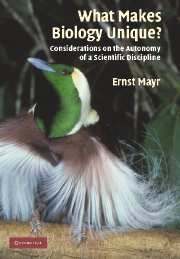Book contents
- Frontmatter
- Contents
- Preface
- Acknowledgments
- Introduction
- 1 Science and sciences
- 2 The autonomy of biology
- 3 Teleology
- 4 Analysis or reductionism?
- 5 Darwin's influence on modern thought
- 6 Darwin's five theories of evolution
- 7 Maturation of Darwinism
- 8 Selection
- 9 Do Thomas Kuhn's scientific revolutions take place?
- 10 Another look at the species problem
- 11 The origin of humans
- 12 Are we alone in this vast universe?
- Glossary
- Index
- References
12 - Are we alone in this vast universe?
Published online by Cambridge University Press: 10 December 2009
- Frontmatter
- Contents
- Preface
- Acknowledgments
- Introduction
- 1 Science and sciences
- 2 The autonomy of biology
- 3 Teleology
- 4 Analysis or reductionism?
- 5 Darwin's influence on modern thought
- 6 Darwin's five theories of evolution
- 7 Maturation of Darwinism
- 8 Selection
- 9 Do Thomas Kuhn's scientific revolutions take place?
- 10 Another look at the species problem
- 11 The origin of humans
- 12 Are we alone in this vast universe?
- Glossary
- Index
- References
Summary
Humans have asked this question for more than 2,000 years, speculating where some other worlds might be, and the question is still alive. At this moment there are a number of devices in operation listening for signals from extraterrestrials on other planets. This activity is referred to as the search for extraterrestrial intelligence (SETI). To simplify the discussion, I refer to those who believe in the existence of extraterrestrials and who attempt to communicate with them as Setians. Most Setians are physicists or astronomers. The speculations of biologists are more modest. With a few exceptions, they do not ask “are there other human-like creatures on other worlds?” but simply “is there other life somewhere in the universe?”. Setians have been running radio telescopes for more than twenty years, not discouraged by the absence of any indications in their recordings that could be interpreted as signals from extraterrestrials. Their opponents believe the evidence opposed to the possibility of success in this endeavor is overwhelming and that it is no longer reasonable to continue the SETI.
What is the reason for the longevity of the argument between the Setians and their opponents?
When reading through the voluminous literature, I was suddenly struck by the realization that two rather different questions were consistently confounded in the controversy:
What is the probability of life elsewhere in the universe?
What is the chance of communicating with extraterrestrials?
- Type
- Chapter
- Information
- What Makes Biology Unique?Considerations on the Autonomy of a Scientific Discipline, pp. 209 - 218Publisher: Cambridge University PressPrint publication year: 2004
References
- 2
- Cited by



